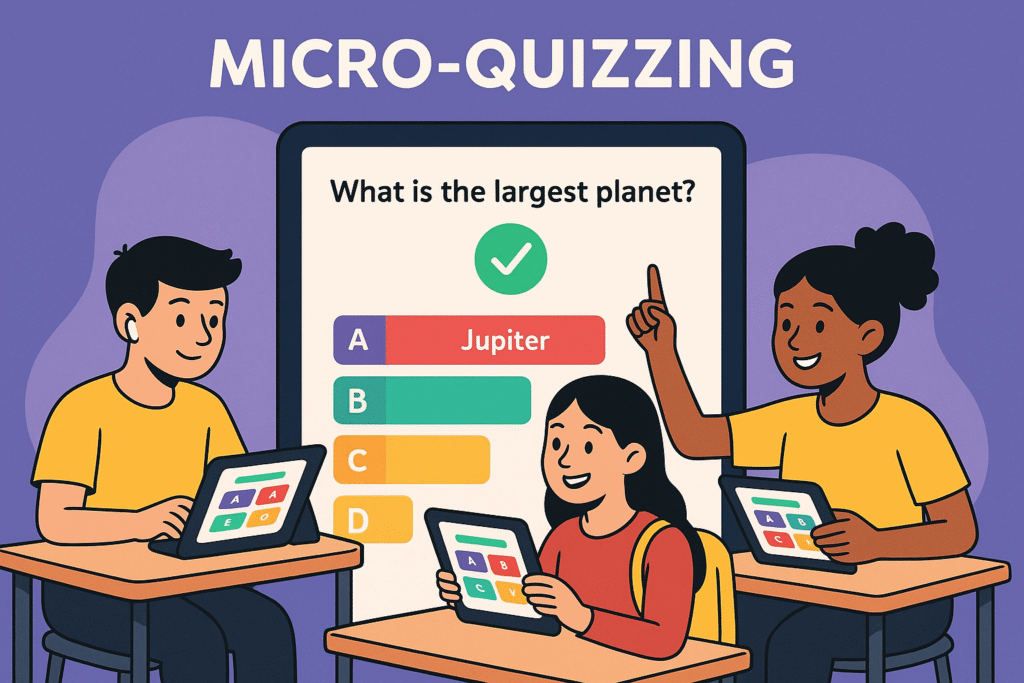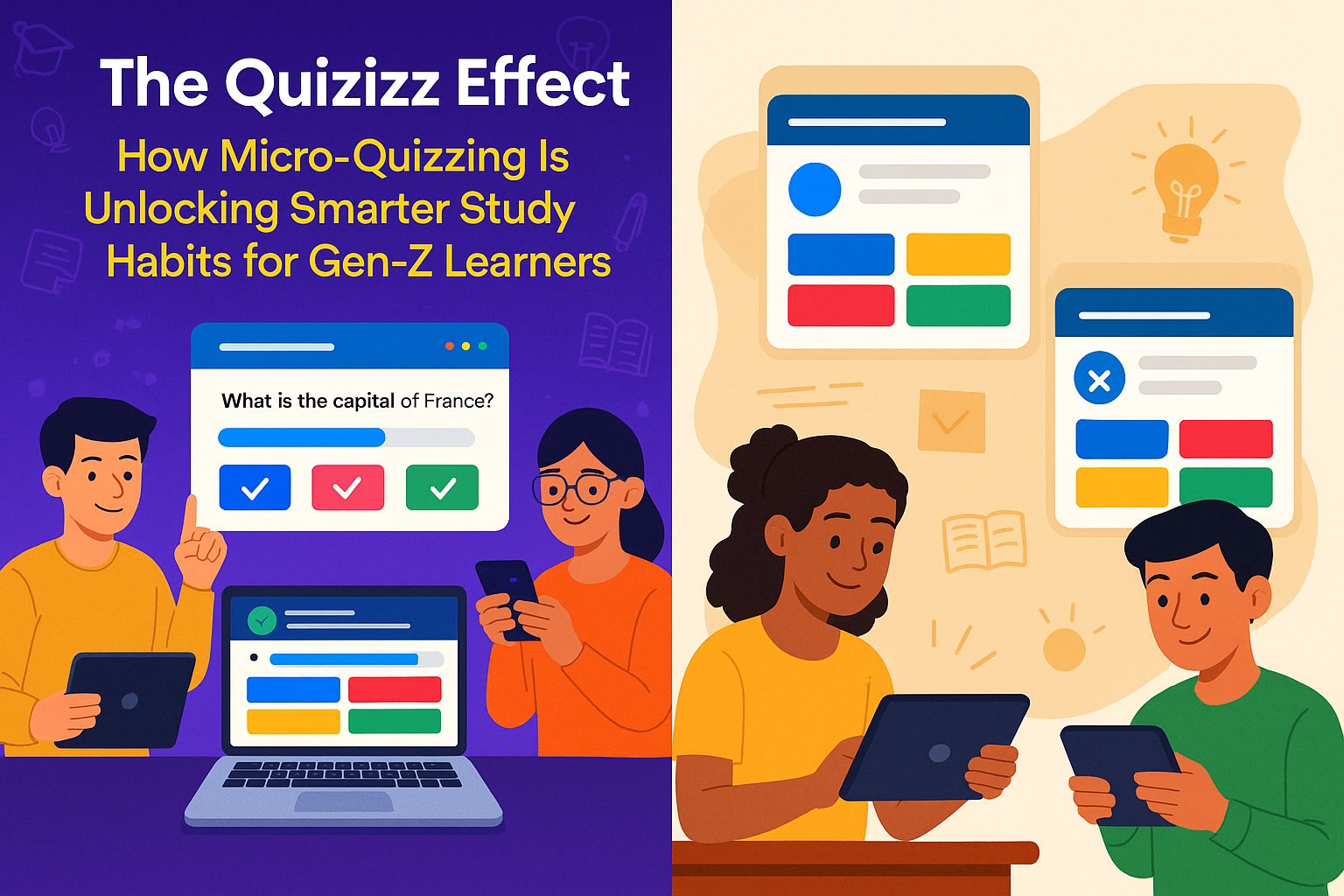A New Learning Habit Is Quietly Taking Over
We all know that Gen-Z learns differently. Their attention spans are shorter—but their ability to absorb information quickly is far greater than previous generations. And quietly, without many people noticing, Quizizz has become the engine powering this new learning style.
What started as a simple quiz game has evolved into a platform where students learn in bursts—small, enjoyable micro-quizzes that sneak learning into daily routines. This shift is shaping the way students remember, revise, and stay engaged.
I call this trend “The Quizizz Effect.”

What Exactly Is Micro-Quizzing?
Micro-quizzing is simple:
Tiny quizzes, taken often, to build strong long-term memory.
Instead of long study sessions, students now:
- play a 5-minute quiz between classes,
- complete a practice set before bed,
- or repeat a topic the moment it becomes weak.
Quizizz didn’t invent the psychology behind this—but it perfected the method with:
- fast rounds
- instant feedback
- gamified points and power-ups
- leaderboards
- and quick repetition
This is the type of learning that actually fits the modern mindset.
Why Gen-Z Responds So Well to Quizizz
Unlike traditional textbooks or lectures, Quizizz treats learning like a game—but without removing the seriousness of education.
Here are a few reasons why students naturally gravitate to it:
1. Learning Feels Rewarding, Not Exhausting
Points, streaks, ranks, and energy levels trigger the same dopamine response found in games.
But here’s the twist: students are actually learning without realizing it.
2. Autonomy: Students Learn at Their Own Pace
Quizizz lets learners:
- replay weak topics
- pause a quiz
- skip ahead
- or revisit past mistakes
Gen-Z values independence, and this platform supports it deeply.
3. Instant Results Build Faster Memory
When a student gets a question wrong, Quizizz immediately shows:
- the correct answer
- why it’s correct
- and how to avoid the same mistake again
This creates a micro-loop of correction → understanding → recall.
4. Competition Helps Students Push Themselves
Leaderboards, live games, and class tournaments add just enough competition to keep students motivated—without overwhelming them.
How Quizizz Quietly Builds Stronger Study Habits
This is where “The Quizizz Effect” becomes clear.
1. Daily Micro-Revisions Become a Habit
Instead of cramming before exams, students slowly build mastery through small, daily quizzes.
2. Repetition Happens Naturally
Quizizz subtly encourages repetition, which strengthens memory far better than long study sessions.
3. Students Become More Curious
Because quizzes are short, students willingly explore topics they weren’t confident about before.
4. Learning Feels More Personal
Quizizz tailors questions based on:
- mistakes
- performance
- progress over time
It feels like having a personal tutor—inside a game.
How Teachers Benefit From the Quizizz Effect
It’s not only students who win.
1. Teachers See Real-Time Weaknesses
Quizizz instantly highlights where the whole class is struggling.
This allows teachers to fix learning gaps before moving ahead.
2. Lessons Become More Engaging
Even the most boring topics transform when wrapped inside a game-like quiz.
3. Teachers Save Time
Generating, reusing, and customizing quizzes cuts down hours of workload.
How Students Describe Their Experience
When students talk about Quizizz, their responses are surprisingly similar:
- “It feels like a break… but I still learn something.”
- “I understand things faster when they’re in a quiz.”
- “I don’t get bored like in normal studying.”
- “Repeating quizzes helps before exams.”
This is what makes The Quizizz Effect so powerful:
Learning doesn’t feel like a chore.
A Quiet Revolution in Modern Learning
Quizizz isn’t just a tool; it’s a behavior-changing platform.
It’s teaching Gen-Z how to learn smarter—not harder.
Shorter study cycles.
Faster recall.
Game-like motivation.
Personalized learning paths.
That is the Quizizz Effect.
And as micro-quizzing continues to grow, it may soon become the default way students learn across the world.
Conclusion
Quizizz has tapped into the psychology of Gen-Z and redesigned learning to match their mindset. Micro-quizzing is more than a trend—it’s a new learning culture. And every time a student opens a five-minute quiz, a smarter study habit quietly forms.
FAQs
Quizizz stands out because it blends gamification, instant feedback, and personalization. Students learn through fun, fast-paced micro-quizzes that feel less like studying and more like a game.
Micro-quizzing reinforces learning in small, repeated bursts. This method aligns with the brain’s natural retention cycle, helping students remember information longer without cramming.
Yes. Quizizz supports quizzes for science, math, language arts, social studies, coding, and even skill-based learning. Teachers can create custom content or use community-made quizzes.
Absolutely. Students can practice alone, retake quizzes, track mistakes, and improve at their own pace, making it ideal for homework or private revision.
Yes. Because students review content daily in small doses, they learn more consistently. This reduces stress during exams and boosts confidence.
Definitely. Micro-quizzing is not limited to school students. College learners benefit heavily from short repetitions, especially in subjects requiring memorization
Yes. Quizizz can work as a self-learning tool. Students can explore topics, replay weak areas, and follow personalized learning paths independently.
